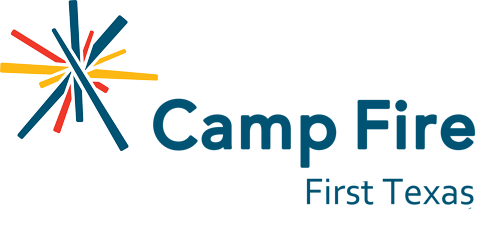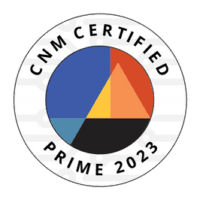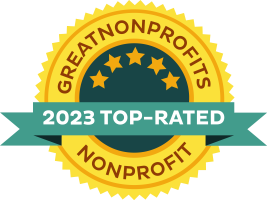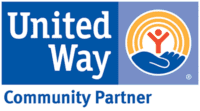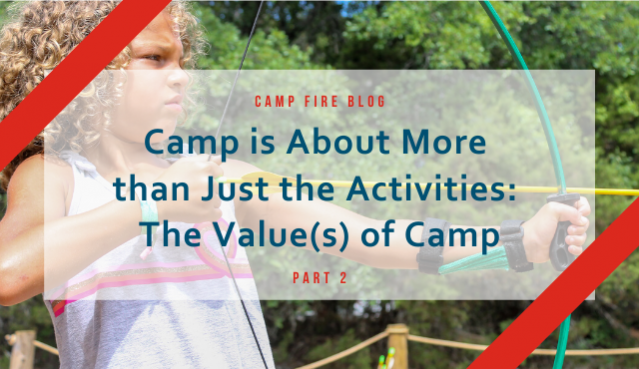
In part 1 of this blog post, I shared the camp experience is about so much more than just the terrific activities. Camp is a place where kids get to learn and practice many vitally important life-skills that will greatly benefit them as they navigate their school years and whatever path they take in their future.
At Camp El Tesoro, each morning we introduce our campers to life skills, which we refer to as the “Values of the Day”. Five of these important life skills were covered in Part 1. Part 2 will cover the remaining four.
6. Respect
Many people believe that respect needs to be earned, but at Camp El Tesoro, we teach the campers that everyone deserves respect and everyone deserves to be seen, heard and valued. In combination with the value of empathy, we teach campers that respect is understanding that you don’t necessarily know what others are going through at any given moment and that you shouldn’t rush to judge others. Respect is also understanding that we are all different and realizing that those differences are a good thing. Respect is believing that every individual’s experiences and opinions are valuable and everyone should be included.
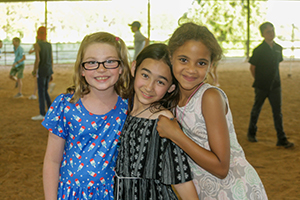
Campers practice respect through many of their camp activities, but especially during their afternoon cabin activities. During cabin activities the campers spend time playing get-to-know-you games. In doing so, they learn about each other’s lives and interests. They also participate in teambuilding activities on the challenge course where they all must work together, contribute their individual strengths while sharing and listening to each other’s ideas in order for the group to succeed.
7. Leadership and Responsibility
Camp is a terrific environment for campers to take on and practice personal responsibility. Campers are given the independence to make choices and to learn responsibility at camp through things like selecting their morning activities, keeping track of their belongings as they travel around camp, and budgeting their money to spend in the camp store.
Additionally, whether it’s putting their dishes away after each meal, ensuring that their area in the cabin is clean each day, or being a part of the Color Guard that raises and lowers the flag, campers are given various responsibilities throughout the week that allow them build responsibility to themselves and the larger camp community.
While many leadership opportunities naturally develop throughout the week for every camper through their morning activities and within their cabins, Camp El Tesoro also provides two formal leadership programs for our high school campers.
All 9th and 10th grade campers who attend a 2-week session of camp can elect to be a Torchbearer or one of their morning activities. During their first week, the Torchbearer participates in their selected activity twice per day to learn from counselors how to prepare and teach the activity. During the second week at camp, Torchbearers then get the opportunity to assist in leading the activity.
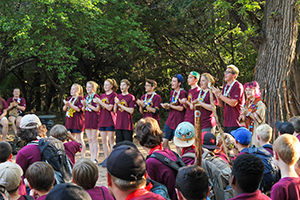 Campers entering 11th and 12th grade have the opportunity to apply and interview for the Counselor-In-Training (CIT) program. Candidates who are accepted to the program make a four-week commitment for two consecutive summers. During the program, CITs participate in a daily “Objectives” session where they learn and build on leadership, communication and program delivery skills. Throughout the day, CITs also help counselors lead songs and skits for campers, set up for evening activities, support counselors teach activities, teach the Values of the Day each morning, job shadow camp staff members, and assist in many other areas of camp.
Campers entering 11th and 12th grade have the opportunity to apply and interview for the Counselor-In-Training (CIT) program. Candidates who are accepted to the program make a four-week commitment for two consecutive summers. During the program, CITs participate in a daily “Objectives” session where they learn and build on leadership, communication and program delivery skills. Throughout the day, CITs also help counselors lead songs and skits for campers, set up for evening activities, support counselors teach activities, teach the Values of the Day each morning, job shadow camp staff members, and assist in many other areas of camp.
8. Problem Solving
For many, camp is the first environment where they make daily decisions without having their parents present, such as choosing their morning activities, how to spend camp store money, and many other things. As a result, campers encounter situations they have not had to deal with or figure out by themselves. While this may seem scary at first, these are really great opportunities for campers to learn critical skill of solving problems for themselves (with the guidance and support of their counselors and the camp staff, of course!).
To help teach problem solving skills in a fun and safe way, counselors take their campers to the challenge course where they facilitate a variety of activities that teach the campers how to work together to solve problems and overcome literal obstacles. After completing (or failing) a challenge course activity, the counselors spend time debriefing with the campers, leading a group discussion to help the campers determine what went well, what could have gone better, what other ideas they could have tried, and how they can apply those lessons to other areas of their life.
9. Trustworthiness and Reliability
Camp is a community. That community is made up of cabin groups and within each cabin, every camper is a critical contributor. It is vital that the campers be able to trust and rely on one another. We teach them that being trustworthy and reliable are essential to help everyone have the best week possible. We teach them it’s important that each camper contributes to their group and helps to support each other, because we are all a team working together.
At camp, campers rely on and trust each other and their counselors in many ways, whether their friends are serving as spotters while they are climbing the rock wall, paddling a canoe with a fellow camper, building a shelter together in Outdoor Living Skills, or performing a skit together during the talent show, campers need to be able to work together, trust and support one another.
Our counselors lead the way and exhibit these skills for the campers. Our staff members are there to support and guide the campers, to celebrate their successes and to help them process their failures, to be a shoulder to lean on and to be a listening ear. Our campers rely on our counselors to lead them around the arena on horseback, to ensure their rock wall harnesses and their lifejackets are on properly, to guide them on hikes around camp, and to help them make friends and lasting memories throughout their time at camp.
Camp changes lives for the better, not only for the campers, but for their families and communities.
Campers can take each and every one of these skills back to their families, their neighborhoods, their schools, their sports teams, their choirs, bands, and every other community that they are a part of, and can help to make a difference.
As a kid, I went to several camps over eight summers. When I look back on my time as a camper, getting to the top of the rock wall, having our cabin win the talent show, or hitting a bullseye at the archery range are not the things that I treasure the most. While I certainly remember those things very fondly, it’s the counselors who made such a positive impact on my life that I treasure the most from my camp experience and what prepared me for so much of my life experiences.
My camp counselors taught me how to be independent, to be responsible for myself, to be a leader, to solve problems, to empathize with others and how to show them respect, to work as part of a team, to challenge myself and to not give up when I fail.
The value of camp is truly incalculable. The things I learned at camp have impacted my life in more ways than I can describe, and as a camp director, it is my goal to help each and every camper who comes across the swinging bridge to learn these skills that will last a lifetime.
I hope to see your campers cross the bridge for years to come, and I can’t wait to see them learn, grow and thrive as they get to experience camp together!
